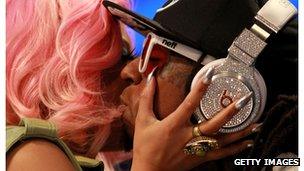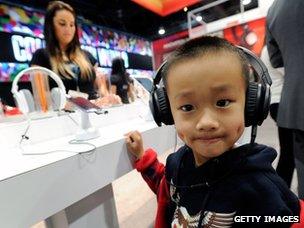From Lemmy to Snooki, celebs are desperate to sell you headphones
- Published
Will.i.am's verdict on the 2013 Consumer Electronics Show
Celebrities are queuing up to put their name on the side of your head. Endorsed headphones, a trend kickstarted by hip-hop star Dr Dre, have become big business.
In 2013, we'll see even more hit the market. So is it a case of big names making a big quick buck, or do they really care about their tech?
Ten years ago, any any self-respecting celebrity wouldn't be found dead at a technology trade show.
But at CES 2013 in Las Vegas, you can barely take a step without spotting celebrity endorsements - and even the celebrities themselves.
This surge of rent-a-face started with a man named Andre Young, better known to music fans as hip-hop legend Dr Dre, whose company Beats Electronics, produced its first hardware in 2008.
The distinctive and trendy Beats By Dre headphones sold by the million, and have become a status symbol for everyone from Premier League footballers to that man on the bus you probably shouldn't talk to.
Dr Dre's company now produces headphones emblazoned with names like Lady Gaga, Lil Wayne and Justin Bieber.
In 2013, the floodgates of celeb-backed technology will well and truly open.

Rap star Lil Wayne wears diamond studded headphones made by Dr Dre's company, Beats Electronics
'Sit up and notice'
In a massively overcrowded market, having a big name celeb on board is crucial if you're to stand out, says Forrester Research analyst Tony Costa.
"Even if a company came out with the greatest headset ever, it wouldn't really hit the popular press radar without a celebrity in there. That's going to make people sit up and notice."
He argued that when a company puts money behind endorsements, they are buying a slice of a demographic, as well as an ability to sell a product consumers may otherwise be uneducated about.
"In certain product categories, you can go through all the specs you want," he says.
"But they're pretty much meaningless for a consumer - response rate, fidelity, hertz and things like that, people don't really know what that means.
"It's hard for you to judge for yourself what quality is, because you're just not an expert in that category."
Demonstrating this theory to great effect is Lemmy, the legendary frontman of metal group Motorhead.
His Motorheadphones, on show at CES, were produced by a company in Denmark.
What sets them apart from others on the market?

Celebs are keen to capture the attention of even the youngest fans
"They've got Motorhead written on them," the veteran rocker tells the BBC.
But joking aside, Lemmy insists he has been part of that creative process.
"They're mid-range, not bass-orientated," he explains, arguing that anything other than hip hop sounds terrible in Dr Dre's product.
"I don't think bass is that important."
Although the vocalist admits he is not technically minded - "Any of my roadies will tell you that!" - his credibility as a pioneering rocker will likely strike a lucrative chord with fans.
"It's being able to sort of key in to key demographics, or key segments of the market, that the celebrity has an affinity towards," Forrester's Mr Costa says.
Snooki
But other celebrities may not carry the same weight when it comes to technological credibility.
"Well, I've always been into technology," muses Nicole Polizzi, better known to reality TV fans as Snooki from Jersey Shore.
"It's a big thing for me because I do travel a lot, always listening to music. I feel like there's no really cute headbands out there."
Her range of products, manufactured by US firm iHip, includes earbud headphones that also double as "cute" earrings - perfect, Snooki tells the BBC, for when you're in the gym.
"I'm trying to come out with a lot just to make it more fashionable out there in the tech world," she adds.
Snooki does not hide the fact that her input in the technical side is minimal, but when your target market is people who value beauty over bass, that's not an issue.
"When Snooki puts her name to something, that's very different to someone like Simon Cowell putting their name to something," says Forrester's Mr Costa.
"People know if it's an A-list or D-list celebrity - that makes a big difference."
As does the price - Snooki's products will retail for around $60.
'Quick win'
One celebrity who stands out in the tech crowd more than any other is will.i.am from the Black Eyed Peas.
Unlike the other celebrities at the event, who arrived flanked by big bruising bodyguards and an army of assistants, will.i.am toured the CES show floor, checking out all of the innovation for himself.
Unsurprisingly, he believes celebrity endorsement of technology is a positive - but only if it's for the right reason: innovation.
Why is Jersey Shore's Snooki at CES?
"It's short-sighted versus long-term commitment in belief and innovation," he tells the BBC.
"Some people are in it to get a quick win, versus believing in something that can help out other generations."
He says that while it may seem like the in thing for A, B, C and even D-listers to put their names to technology products, he doesn't see technology as a "sexy" industry. At least, not yet.
"No! It's sexy when my niece says I want to be a computer scientist - that's when it's sexy."
Lemmy, meanwhile, is less pensive on the future of tech endorsements and their potential impact on future generations.
"Oh, I dunno," he says. "I don't care."
Off the rails
Like any celebrity endorsement, having branded headphones or other equipment does carry considerable risks.
After it emerged that golfer Tiger Woods had had several affairs, his deal with Nike collapsed - having a massive impact on sales. The same could certainly happen to technology firms, Mr Costa warns.
"You can't manage it the same way you manage your own brand," he says. "You don't control them, you don't own them. They're not always going to be on message necessarily.
"Tiger Woods for the longest time was the gold standard, Lance Armstrong is another example. Even those guys screw up."